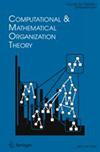Organizational Routines as a Source of Ethical Blindness
IF 1.5
4区 管理学
Q3 COMPUTER SCIENCE, INTERDISCIPLINARY APPLICATIONS
Computational and Mathematical Organization Theory
Pub Date : 2022-01-01
DOI:10.1177/26317877221075640
引用次数: 2
Abstract
Organizational research has shown that decision-makers can be subject to ethical blindness, a temporary inability to see the ethical dimension of a situation at hand. Previous theoretical approaches have identified organizational routines—recurring multi-actor practices—as important indirect context factors of ethical blindness. The present article argues that earlier theorizing is incomplete. Organizational routines may be a much more direct cause of ethical blindness and they may play a much stronger role in fostering unintentional unethical behavior than is currently acknowledged. As its main contribution, the article synthesizes research on unethical organizational behavior with findings on the micro-foundations of organizational routines to systematically theorize about when and how routines can directly cause ethical blindness. Given that organizational routines are not only a main pillar of organizational research but an indispensable part of organizational life, an increased understanding of their role in creating ethical blindness is of high theoretical and practical relevance. In particular, a routine-based explanation of ethical blindness may help in identifying and counteracting “everyday” unethical practices that are prevalent in modern business organizations.组织惯例是伦理盲目性的来源
组织研究表明,决策者可能会受到道德盲目性的影响,即暂时无法看到手头情况的道德层面。以前的理论方法已经确定了组织惯例-反复出现的多参与者实践-作为伦理盲目性的重要间接背景因素。本文认为,早期的理论是不完整的。组织惯例可能是道德盲目性的一个更直接的原因,它们可能在培养无意的不道德行为方面发挥比目前公认的更大的作用。本文的主要贡献在于,将非伦理组织行为的研究与组织惯例的微观基础研究相结合,系统地理论化了惯例何时以及如何直接导致伦理盲目性。鉴于组织惯例不仅是组织研究的主要支柱,而且是组织生活中不可或缺的一部分,因此增加对其在造成伦理盲目性中的作用的理解具有很高的理论和实践意义。特别是,对道德盲目性的常规解释可能有助于识别和抵制现代商业组织中普遍存在的“日常”不道德行为。
本文章由计算机程序翻译,如有差异,请以英文原文为准。
求助全文
约1分钟内获得全文
求助全文
来源期刊

Computational and Mathematical Organization Theory
COMPUTER SCIENCE, INTERDISCIPLINARY APPLICATIONS-MATHEMATICS, INTERDISCIPLINARY APPLICATIONS
CiteScore
3.80
自引率
16.70%
发文量
14
审稿时长
>12 weeks
期刊介绍:
Computational and Mathematical Organization Theory provides an international forum for interdisciplinary research that combines computation, organizations and society. The goal is to advance the state of science in formal reasoning, analysis, and system building drawing on and encouraging advances in areas at the confluence of social networks, artificial intelligence, complexity, machine learning, sociology, business, political science, economics, and operations research. The papers in this journal will lead to the development of newtheories that explain and predict the behaviour of complex adaptive systems, new computational models and technologies that are responsible to society, business, policy, and law, new methods for integrating data, computational models, analysis and visualization techniques.
Various types of papers and underlying research are welcome. Papers presenting, validating, or applying models and/or computational techniques, new algorithms, dynamic metrics for networks and complex systems and papers comparing, contrasting and docking computational models are strongly encouraged. Both applied and theoretical work is strongly encouraged. The editors encourage theoretical research on fundamental principles of social behaviour such as coordination, cooperation, evolution, and destabilization. The editors encourage applied research representing actual organizational or policy problems that can be addressed using computational tools. Work related to fundamental concepts, corporate, military or intelligence issues are welcome.
 求助内容:
求助内容: 应助结果提醒方式:
应助结果提醒方式:


